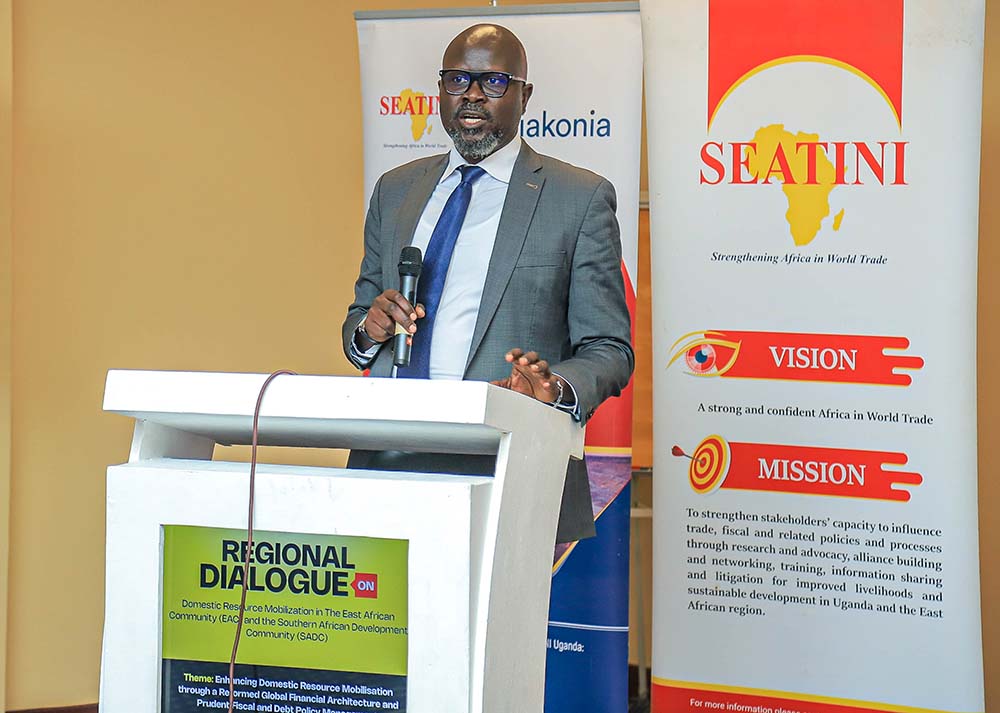EAC asked to reduce foreign aid dependence capacity
“Effective domestic resource mobilisation requires competent institutions, functional state systems, and leadership capable of aggregating commitments to achieve harmonised tax and digitalised revenue systems,” Odong said.
The dialogue, held under the theme: Enhancing Domestic Resource Mobilisation through Reformed Global Financial Architecture and Prudent Fiscal & Debt Policy Management, was organised by the Southern and Eastern Africa Trade Information and Negotiations Institute (SEATINI).
East African Community (EAC) member states have been urged to build internal capacities that will protect them from depending on foreign aid.
This is because foreign aid is becoming an avenue in which donors advance their own interests, which in the long run compromises domestic revenue collection in African countries.
The call was made by George Odong, the chairperson of the East African Legislative Assembly (EALA) Uganda Chapter, on November 25, 2025, during the online Regional Dialogue on Domestic Resource Mobilisation in EAC.
The dialogue, held under the theme: Enhancing Domestic Resource Mobilisation through Reformed Global Financial Architecture and Prudent Fiscal & Debt Policy Management, was organised by the Southern and Eastern Africa Trade Information and Negotiations Institute (SEATINI).
Odongo added that to mobilise resources effectively, African governments should create sustainable, inclusive financing mechanisms that reduce dependency and vulnerability.
Examples of sustainable and inclusive financing mechanisms that Uganda has put in place, include digital money like mobile money services, the Parish Development Model, Emyooga, the Youth Livelihood Fund and the GROW project targeting women in business.
Odongo remarks during the regional dialogue organised by SEATINI Uganda.
Odongo said that for the above interventions to remain sustainable, governments should build internal capacities that will protect them from externally imposed interests.
This can be done through strengthening domestic laws and closing loopholes but also to formalise activities that generate resources. According to him, a significant portion of potential revenue is lost due to a large informal sector and illicit financial flows.
He, however, added that the above suggestions will be effective if the Government puts in place effective domestic revenue mobilisation avenues.
“Effective domestic resource mobilisation requires competent institutions, functional state systems, and leadership capable of aggregating commitments to achieve harmonised tax and digitalised revenue systems,” Odong said.
Failure to do so, Odongo said that Africa’s regional integration agender may not realise sufficient resources, because these are needed to finance infrastructure, industrialisation, and youth employment, among others.
Jane Nalunga, the executive director of SEATINI Uganda, added that with robust co-ordinated regional platforms that bring stakeholders together, some of the issues raised above will be addressed.
Commenting on taxation as resource mobilisation avenue, Nalunga said regional tax regimes are fragmented and incohesive, weakening trade, political and fiscal power.
“Harmonisation is essential to support integration, privatisation of trade, and effective negotiation at international levels. Because despite the potential, domestic resources in many African countries remain low, with GDP-to-revenue ratios far below the ideal 25%, highlighting the urgency to enhance revenue collection strategies,” she added.
Herbert Kafeero, the programme and communications manager SEATINI Uganda, said the regional dialogue was to assess the current state of domestic revenue mobilisation in the eastern and southern Africa regions, and to identify priority policy reforms that strengthen fiscal sustainability and resilience.
He said many countries across the EAC and SADC are increasingly reliant on borrowing, creating what can be described as a debt entrapment.